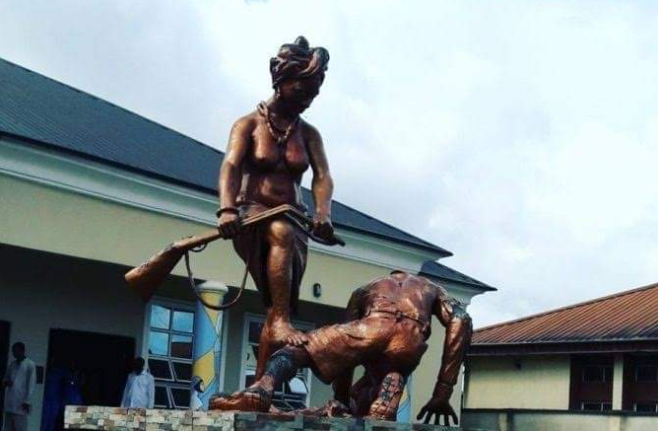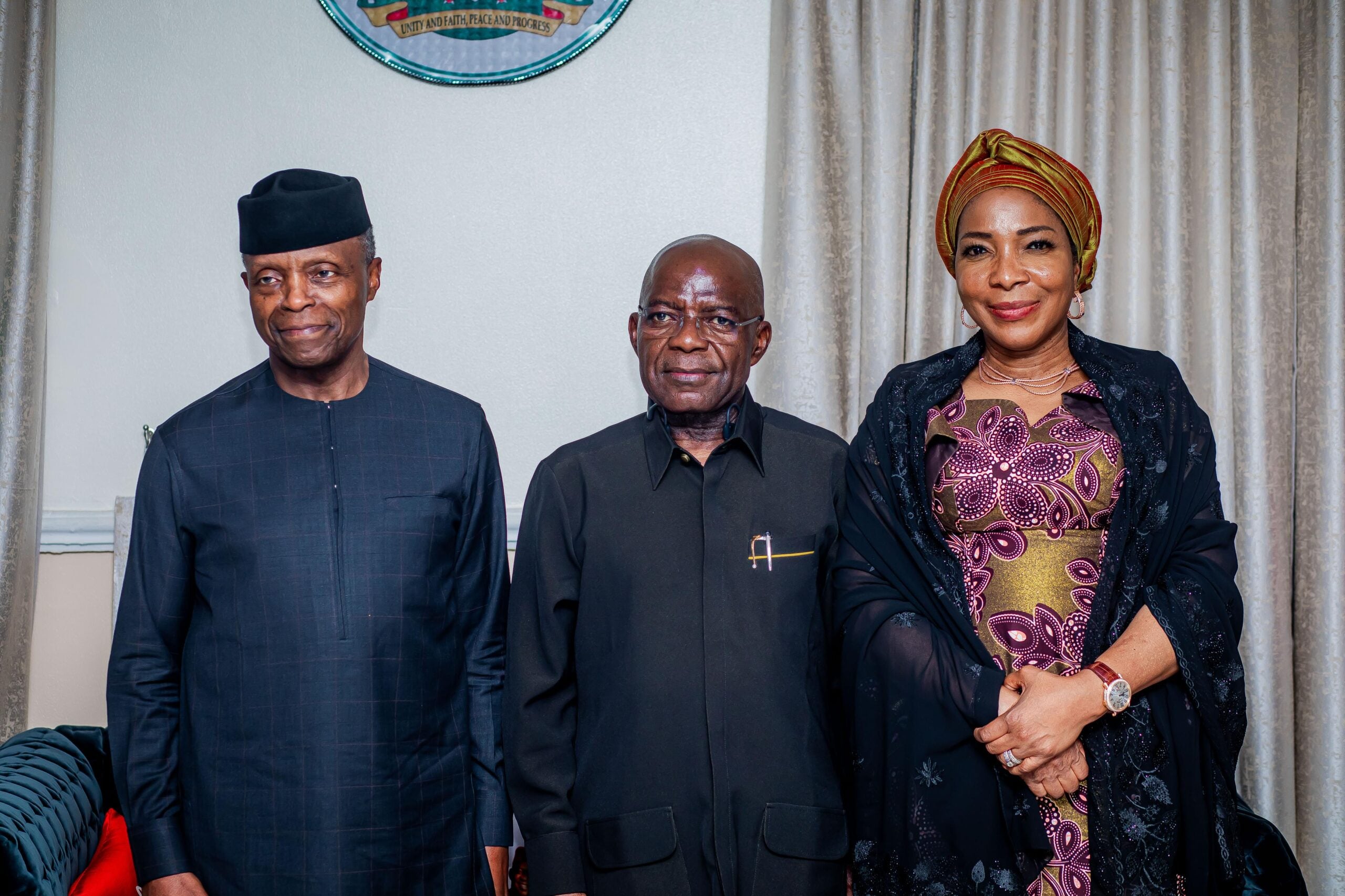Featured
SOLILOQUY: History 101: Don’t Say Aba, It Was Ikot Abasi Women Riot!
Published
2 years agoon
By
Eric
By Michael Effiong
History is said to be the record of past events. It is actually the combination of two words-His (apologies to the women activists) and story. So technically, it is the story as told by someone.
Therefore, the person telling the story is of great significance and that is why when you flip through the Holy Bible’s New Testament, you will find Matthew, Mark, Luke and John recording and reporting almost the same events but their nuances are obvious .
What this means is that history can be distorted or more accurately embellished or twisted to fit the narrative of the writer.
This essentially was what famous writer, Chimanda Ngozi Adichie was canvassing in her TED Talk titled “The Danger of a single story”.
Adichie believes that stories matter, but that all too often in our lives we operate from the perspective of hearing and knowing a single story- about a person or situation.
She went further to state that the risk of the single story is that it can lead us to default assumption, conclusions and decisions that maybe incomplete and/or completely false.
For her, in any historical account, who told the story, how and when the story was told can taint, frame and affect the narrative.
It is within this context that one has to examine the false narrative by historians that there was an “Aba Women Riot”, when in fact the only recorded riot that led to deaths of women in 1929 happened in Ikot Ibasi, in present day Akwa Ibom State and therefore, that riot, should appropriately have been referred to as IKOT ABASI WOMEN RIOT!
This is how the incident is recorded if you consult Google: According to American Historical Association: “In Nigeria there occurred what colonial historians have called the Aba Women’s riots of 1929, but it should be termed the Aba Women’s rebellion. This was touched off by the imposition of direct taxation and the introduction of new local courts and especially of warrant chiefs.” [A. Adu Boahen, African Perspectives on Colonialism (Baltimore, 1987), p. 79.
“Here is one account of this rebellion by a person who called the episode a riot in her 1937 book, Native Administration in Nigeria (London, 1937). The author, Margery Perham, was regarded as a friend of Nigeria and the Igbos until the Biafran secession movement. The participants in this event were Igbo”.
Wikipedia: The Aba Women’s Riots of 1929 (Igbo: Ogu Umunwanyi; Ibibio: Ekong Iban) was a period of unrest in colonial Nigeria over November 1929. The protests broke out when thousands of Igbo women from the Bende District, Umuahia and other places in southeastern Nigeria traveled to the town of Oloko to protest against the Warrant Chiefs, whom they accused of restricting the role of women in the government. It was organised and led by the rural women of Owerri and Calabar provinces.
If you look carefully at the “authorities” quoted above, you will realise that none is from the very area or have any relationship with those who actually were involved in the situation and therefore, even if it was oral history that they used to develop their account, it could certainly not have been accurate.
For those who don’t know ,the riots built up from the January 1, 1914 when the first Nigerian colonial Governor, Lord Lugard instituted the system of Indirect Rule in Southern Nigeria. Under this plan, the British Administrators ruled through Warrant Chiefs, who worked with the colonial officers.
The Warrant Chiefs as is the case with some people in power became power drunk, they became oppressive, seized property, imposed draconian regulations and even imprisoned those who opposed as the years went by.
It was within this context that the British colonial administration decided to impose a special tax on Market women in 1929.
So, it was not long that the women decided to take matters in their hands and began to protest in many cities but there is no evidence that the women were shot at and killed like was done in Ikot Abasi. How did I know? Well the scars and evidence are right there in Ikot Abasi!
That is not all, to drive this point home, the Ikot Abasi protest was led by the paternal grandmother of the former minister and senator, Udoma Udo Udoma. She was even killed in the process.
Udoma in an interview said he never met the brave woman, but he heard enough stories about her to make him proud of his heritage.
According to him: “As you all know Madam Adiaha-Edem, the leader of the Ikot Abasi women protesters was my paternal grandmother. She was a very successful trader and community leader. As a big trader, she was a wholesale distributor of products such as bar soap, salt, detergents, stockfish, and kerosene. Her traded volumes were so large that, to guarantee her supply, she used to deposit large sums of money with such big trading outfits as G.B. Ollivant Limited and African Traders Corporation. She also had a big market stall and was a seamstress. A very enterprising woman indeed!”
“But not only was she successful, she was also independent minded. She did not mind going against local norms once she was convinced about something. That was how she converted to Christianity, a few years after my father was born.
She became such a strong Christian that she even tried to convert her husband, my grandfather. But my grandfather was adamant that as a leading and highly respected figure in the society, and as a custodian of the culture and traditions, he could not abandon the beliefs of his ancestors! This caused tremendous stress in their marriage and led, ultimately, to a divorce.
“She was a truly remarkable woman. Unfortunately, since she was killed in 1929, and I was born in 1954, I never met her. I don’t even know what she looked like because in 1929 our people had not yet developed the practice of taking studio photographs of themselves. However, as a young boy, I heard stories of what happened to my grandmother. I used to marvel at her bravery and courage and that of all the women who accompanied her in confronting the British colonial administration.”
“The immediate cause of the protest was the introduction of direct taxation, which the women understood was going to be extended to trading and other activities, principally carried on by women. Whilst the introduction of direct taxation in 1929 was resented by all, it was the women who were adamant that they were not going to pay any such taxes”.
“Many of the women were, like my grandmother, traders, and they travelled around and had extensive connections. The first protests erupted in Oloko in Owerri Province on November 23, 1929. It spread quickly to Aba and certain parts of Calabar province. But it was in Egwanga, now called Ikot Abasi, that the protests came to a head. In the afternoon of Sunday, December 15, 1929, the angry women stormed the buildings of the native court and part of the staff quarters.
“The next day, Monday, December 16, the women were invited to meet with the District Officer, A. R. Whitman. Even though some of the women were reluctant, my grandmother, as their leader, convinced them to go. She reckoned that change could only come after engagement and negotiation. She led the women leaders to meet with Whitman and presented him with a list of seven demands – the most prominent was a commitment from the government not to tax women.
“Just after the document had been typed, signed and distributed, more women arrived, and a crowd surged towards the office breaking through the stick fence. Even though the women were unarmed, Whitman lost his nerve and ordered the soldiers to open fire.
“A Captain Hill, who commanded the troops, was the first to fire. He brought out his pistol and shot my grandmother at point blank range. She died on the spot. The other soldiers fired their rifles straight at the women and twenty-five women were killed outright. More women were killed in the ensuing stampede. They were pursued all the way to the waterfront”. What a tragic day.
“There was palpable shock that unarmed women who were simply protesting against government policy could have been mowed down in this manner. My father, who was then just 12 years old, was invited to the scene by the British to identify the body of his dead mother. He was inconsolable and was traumatised by that incident. The whole community was in shock. How could this have happened to some of the leading women in the community who were simply exercising their rights of protests!
“The government immediately deployed more troops to Ikot Abasi and announced the setting up of a commission of inquiry headed by Donald Kingdom. As to be expected, in its report, the commission described it as a mob action directed at overthrowing the colonial administration and justified the action of the district officer.
“However, the women’s riot had a tremendous impact on the subsequent development of women in the region, and on the colonial administration itself. A number of administrative reforms were introduced in the years following the protests, including appointing some women as Warrant Chiefs”. We can therefore say, that this first real resistance movement by the brave Ikot Abasi women was not in vain.
This is the true story as told by someone who should know, who was technically, directly affected, and there is no way that I will doubt the account of Senator Udoma.
His account would have been formed by oral history passed down by family members especially his father, Justice Egbert Udo Udoma, KBE,.
Sir Udoma who lived to the ripe old age of 84 was a lawyer and justice of the Nigerian Supreme Court. He was Chief Justice of Uganda from 1963 to 1969. He spent 13 years as a judge on the Supreme Court of Nigeria and was chairman of the Constituent Assembly from 1977 to 1978. He was one of the founding fathers of Nigeria.
Udoma was not just a guiding light to many, but also an astute scholar, erudite jurist and great legal mind, and he was one of the “Few Good Men” that Nigeria has ever produced. He could certainly not have lied about going to identify his mother’s lifeless body and the incident of that day.
Though the true story of this sad historical incident has been aptly captured in a story, dance and drama by Joseph Edgar aka Duke of Shomolu in one of his works titled “‘Ufok Ibaan – the Ikot Abasi Women’s Uprising’, the truth is too bitter for many to swallow, and so it did not trend.
But one thing is sure though, soon, very soon, Ikot Abasi will get its rightful pride of place as the town in Nigeria where brave unarmed women were killed in 1929 and the misnomer of “Aba Women Riot” will be finally corrected and the tag “ Ikot Abasi Women Riot” raised for tourists to come, see and spread the word!
Related
You may like
Featured
Vote Buying, Low Turnout Mar FCT Polls – Yiaga Africa
Published
4 hours agoon
February 21, 2026By
Eric
A civil society organization, Yiaga Africa, has released its preliminary report on the 2026 Federal Capital Area Council Elections held on Saturday.
The civic group reported that vote buying was witnessed at various polling units in the election.
The Independent National Electoral Commission (INEC) conducted elections for the position of chairman in the six area councils of the FCT, as well as for 62 councillorship seats.
Yiaga Africa said it deployed trained and duly accredited roving observers to systematically monitor the conduct of the elections.
It said that its observers were deployed by 7:30am and covered polling units across the sixty-two wards of the FCT, with their mandate including observing key aspects of the voting process, including opening procedures, accreditation, voting, and counting.
Yiaga Africa said it observed that the election was conducted in a largely peaceful atmosphere, adding that voters who presented themselves at polling units were afforded the opportunity to exercise their franchise without widespread disruption but added that notwithstanding this enabling environment, voter turnout was generally low, with most polling units recording poor turnout.
It said that logistical challenges adversely affected the timely commencement of polling, particularly in the Abuja Municipal Area Council, AMAC, where delays in the deployment of personnel and materials contributed to late opening in several locations.
It added that the relocation of certain polling units coupled with inadequate and untimely communication of these changes to voters generated confusion and may have resulted in voter disenfranchisement saying that such administrative lapses have significant implications for electoral access and public
On its preliminary findings, the election watch agency said: “Yiaga Africa observers reported a delayed commencement of polling in several polling units, primarily attributable to logistical inefficiencies and, in some instances, election security–related challenges.
“As of 9:00 a.m., set-up activities were still ongoing in the majority of polling units observed, indicating that essential preparatory procedures had not been completed within the timeframe prescribed by electoral guidelines.
“In the Abuja Municipal Area Council (AMAC), particularly in Wuse and Gwarinpa wards, several polling units opened significantly behind schedule. Observers noted that polling officials were still arranging materials and organizing the voting environment as at 9:00 a.m., with accreditation and voting commencing only after 10:00 a.m. On average, across the sampled polling units observed, accreditation and voting began at approximately 10:00 a.m.
“Consistent with the Commission’s guidelines, critical election materials including the Bimodal Voter Accreditation System (BVAS) devices and the voter register—were deployed in the polling units observed.
“However, in Polling Unit 004, Wuse Ward, Zone 2 Primary School, the voter register was not initially available and was only produced after observers raised concerns and voters objected. In addition, essential voting materials were absent in certain locations. Voting cubicles were not observed in PU002 (Ward 09), PU006 (Ward 01), and PU012 (Ward 10) in Abaji Area Council. Furthermore, an ink pad required for the voting process was reportedly missing in one polling unit observed.
“Observers reported instances in which voters were reassigned to newly created polling units without prior or adequate notification. While Yiaga Africa acknowledges INEC’s efforts to notify affected voters via SMS, many of these messages were delivered on Election Day, with some received hours after polling had already commenced. The lack of timely and effective communication generated confusion at several polling locations, as numerous voters spent over an hour attempting to ascertain their designated polling units.
“In multiple instances, this administrative shortcoming contributed to congestion and
overcrowding, thereby undermining orderly queue management and potentially
discouraging voter participation.
“The observation further revealed significant disparities in voter distribution within the same polling locations. Such pronounced imbalances raise serious concerns regarding the coherence, and reliability of the Commission’s polling unit expansion and voter redistribution framework.
“Closing of Polling Unit before the official 2:30pm: Observers reported some polling
units closing the polling process before the official 2:30pm close time. While some
polling units experienced poor voter participation, the guideline requires the polling unit to remain open until 2:30pm or the last person on the queue votes.
“Security Deployment and Observer Access: Yiaga Africa observed heavy security deployment in certain locations, which, in some instances, impeded the movement of accredited election observers and restricted access to polling units. Observers further noted that the heightened security presence created barriers for citizens attempting to
access polling units to exercise their right to vote.
“Vote buying: The persistent menace of vote buying once again manifested during the election. Yiaga Africa observers documented incidents of vote buying at polling units, underscoring the continued vulnerability of the electoral process to monetary inducement.
“Despite prior assurances and directives issued by INEC to security agencies to identify and apprehend both vote buyers and sellers, these illicit practices reportedly continued in several locations.”
DailyPost
Related
Featured
I’m Proud of You, Osinbajo Tells Abia Gov Alex Otti
Published
2 days agoon
February 19, 2026By
Eric
Former Vice President Yemi Osinbajo has applauded Governor Alex Otti of Abia State for what he described as purposeful, people-centered leadership that is repositioning Abia State for sustainable growth and prosperity.
Speaking during his visit to the governor in his office on Wednesday, February 18, which coincided with Otti’s birthday, Osinbajo expressed deep appreciation for the governor’s hospitality and outstanding performance in office, noting that the true essence of public service is making meaningful differences on the lives of the people.
“I am extremely proud of the work you have done so far, you have lived up to expectations – not only to the people but also to your friends and associates. In the short time I have been here, I have seen tangible evidence of progress.” The former Vice President stated.
Prof. Osinbajo particularly commended Governor Otti’s bold social welfare reforms, including assenting into law, the Senior Citizens’ Law.
He described the initiatives as exemplary and deeply rooted in compassion and social responsibility, emphasising that the world’s most successful welfare systems are built on care for the vulnerable.
He also lauded the extensive road infrastructure renewal and improved connectivity across the State, describing the projects as visible symbols of purposeful and results-driven leadership. While reflecting on the demands of leadership, Prof. Osinbajo noted that while many aspire for public office, true distinction lies in delivery.
“Sometimes you wonder whether, after all the efforts to get into office, leaders are able to fulfill their promises. But in your case, you have done not just what you promised, but even more. You have made public service worthwhile,” Prof. Osinbajo added.
He prayed for renewed strength, wisdom, and divine favour for Governor Otti as he continues the work of transformation in Abia State.
In his response, Otti warmly welcomed Osinbajo, describing him as a brother, friend, and mentor, whose visit was deeply appreciated.
The governor clarified that the gathering was not a planned birthday celebration but just marking the day, noting that he rarely celebrate such occasions publicly, especially while serving in public office.
He expressed gratitude to well-wishers who came voluntarily and emphasised his preference for modesty and focus on service.
Otti thanked God for the progress recorded within 32 months in office, describing the administration’s achievements as modest but impactful.
He reiterated that governance must remain centered on the welfare and security of the people.
“Governance is about the people their welfare, their safety, and their peace of mind. If you enter office for any other reason, you miss the essence of leadership,” Governor Otti stated.
He recalled decisive actions taken in the administration’s first month, when some local governments were under the control of non-state actors. The governor said that firm intervention restored order and ensured that communities once inaccessible are now safe and open to residents.
Governor Otti also commended security agencies for their round-the-clock dedication, acknowledging their sacrifices in maintaining peace and stability across the state.
“We are grateful to the men and women who stay awake so that our people can sleep in peace,” Otti stated.
Earlier, the Secretary to the State Government, Dr. Emmanuel Meribole, on behalf of the State Executive Council, extended warm birthday wishes to the governor, praying for continued strength and fruitful years ahead.
Related
Featured
Gunmen Invade Ondo Palace, Kill Monarch in Failed Abduction Attempt
Published
3 days agoon
February 19, 2026By
Eric
Suspected armed bandits have killed a traditional ruler, Oba Kehinde Falodun, the Alagamo of Agamo community, during a violent assault on his palace in Akure North Local Government Area of Ondo State.
The attackers, reportedly about 10 in number, were said to have stormed the monarch’s residence on Wednesday evening in what residents described as an attempted abduction of the royal father and members of his household.
According to the Olori (Queen), who narrowly escaped, the gunmen initially attempted to whisk the monarch away but encountered resistance before the situation escalated.
“The bandits just came and started shooting. They were about 10. Three stayed at the entrance while others came inside. I ran into the bush. They shot at me, but it did not affect me,” she said.
She added that when the kidnappers failed to subdue the monarch, they resorted to violence.
“They kept dragging my husband, and I kept shouting for help. Later, they hit something on his head and stomach. He has been killed,” she said.
Confirming the incident on Thursday, spokesman for the Nigeria Police Force in Ondo State, DSP Abayomi Jimoh, said the command received distress information around 7:50 pm from a community leader.
He said about six armed men invaded the palace, forcefully took the monarch from his compound, and fled.
“The victim was later found a few metres away with gunshot wounds. He was confirmed dead at the scene,” Jimoh stated.
He disclosed that the Divisional Police Officer, alongside tactical teams, immediately mobilised officers and local security groups, including Amotekun Corps, hunters, and Atuluse vigilantes, to comb nearby bushes in search of the attackers.
According to him, surveillance has been intensified across the area while efforts continue to track and apprehend the suspects.
“The Command assures residents that no stone will be left unturned in bringing those responsible to justice,” he added.
Meanwhile, elders and traditional chiefs in Agamo have condemned the killing, describing the late monarch as a peace-loving leader who played a major role in resolving disputes and promoting development in the community.
A community leader, who asked not to be named, said the attack has created fear and a leadership vacuum.
“This is a painful loss to us. Kabiyesi was very close to the people. We appeal to government and security agencies to act fast and ensure those behind this are arrested,” he said.
The incident adds to growing security concerns in the state, where kidnappings, attacks on farmers, and assaults on rural communities have increased in recent months.
Related



Adding Value: Confidence and Succces by Henry Ukazu

Vexatious and Meddlesome: ADC Condemns Wike’s Tour of FCT Polling Units

Vote Buying, Low Turnout Mar FCT Polls – Yiaga Africa

The Power of Strategy in the 21st Century: Unlocking Extraordinary Possibilities (Pt. 2)

The Oracle: Entertainment, the Next Hope for Nigeria After Oil (Pt. 1)

Friday Sermon: Reflections on Ramadan 1: Prophet’s (SAW) Ramadan Sermon

I’m Proud of You, Osinbajo Tells Abia Gov Alex Otti

WAEC Releases 2025 CB-WASSCE for Private Candidates, Withholds 1899 Results

Alleged N432bn Fraud: El-Rufai Spends Monday Night in EFCC Custody

Loyalty to APC Reason I’ll Oppose Gov Alex Otti in 2027 – Orji Kalu

Ogbunechendo, Ooni Differ on Southern Traditional Rulers’ Council

FG Files Charges Against El-Rufai over NSA Phone-tapping Claims

Senate Passes Electoral Act Amendment Bill 2026

INEC Promises e-transmission of FCT Council Poll Results, Warns Against Vote-buying
Trending
-

 News5 days ago
News5 days agoWAEC Releases 2025 CB-WASSCE for Private Candidates, Withholds 1899 Results
-

 Headline5 days ago
Headline5 days agoAlleged N432bn Fraud: El-Rufai Spends Monday Night in EFCC Custody
-

 Featured4 days ago
Featured4 days agoLoyalty to APC Reason I’ll Oppose Gov Alex Otti in 2027 – Orji Kalu
-

 Featured4 days ago
Featured4 days agoOgbunechendo, Ooni Differ on Southern Traditional Rulers’ Council
-

 Headline6 days ago
Headline6 days agoFG Files Charges Against El-Rufai over NSA Phone-tapping Claims
-

 National4 days ago
National4 days agoSenate Passes Electoral Act Amendment Bill 2026
-

 Featured3 days ago
Featured3 days agoINEC Promises e-transmission of FCT Council Poll Results, Warns Against Vote-buying
-

 News3 days ago
News3 days agoDSS Arrests El-Rufai After Release from EFCC Custody

